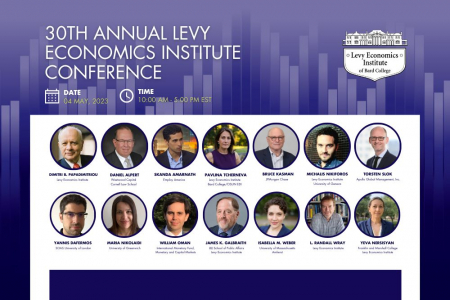Filter by
4216 results found
-
Event
Intensive Course in Gender-Sensitive Macroeconomic Modeling for Policy Analysis
An Intensive Virtual Course in Gender-Sensitive Macroeconomic Modeling for Policy Analysis June 28–July 16, 2021 Organized by the American University’s Care Work and the Economy Project and Levy Economics Institute of Bard College The purpose of this course is to engage with fellow economists to enhance capacity building in research and teaching of gender-sensitive economic […] -
Event
29th Annual Hyman P. Minsky Conference on the State of the US and World Economies
A virtual conference organized by the Levy Economics Institute of Bard College May 5–6, 2021 This year the Hyman P. Minsky Conference on the State of US and World Economies was a two-day, virtual event featuring speakers from government, academia, financial institutions, and the media, as well as Levy Institute scholars. Presenters included Robert Kaplan, […] -
Event
Women’s Economic Empowerment and Control over Time in Sub-Saharan Africa
Women’s Economic Empowerment and Control over Time in Sub-Saharan Africa November 1–November 2, 2021 The onset of the COVID-19 pandemic and the subsequent losses in lives and livelihoods are looming over Sub-Saharan Africa. As in the rest of the world, the pandemic has exposed the enduring inequalities and injustices in stark terms, including those based […] -
Event
2022 Summer Seminar
Levy Economics Institute of Bard College Blithewood Annandale-on-Hudson, N.Y. June 11–18, 2022 The Levy Economics Institute of Bard College held its summer seminar, June 11–18, 2022. Through lectures, hands-on workshops, and breakout groups, the seminar provided an opportunity to engage with the theory and policy of Modern Money Theory (MMT) and the work of Institute […] -
Event
Gender Inequalities and Economic Theory and Policies for a Post-Pandemic World
Blithewood Annandale-on-Hudson, NY September 21–23, 2022 A workshop organized by the Levy Economics Institute of Bard College with the generous support of The William and Flora Hewlett Foundation The goal of this workshop is to explore ways to advance the integration of gender and unpaid activities into economic analyses. Economic processes, outcomes, and policies involve […] -
Event
Patriarchy and Women’s Economic Empowerment
A workshop organized by the Levy Economics Institute of Bard College and Department of Economics, University of Ghana Venue: Cedi Conference Centre, University of Ghana, Accra Date: October 10, 2022 The main purpose of the workshop is to present the findings from the research project “Women’s economic empowerment and control over time: a meso-, and […] -
 Event
Event30th Annual Levy Economics Institute Conference
The 30th Annual Levy Economics Institute Conference was a one-day, virtual event organized around the topics of climate change and fiscal/monetary policy, inflation, unemployment and job creation, and the US macroeconomic outlook. You can now view the video recordings here. Presenters Included Daniel Alpert, Westwood Capital and Cornell Law School; Skanda Amarnath, Employ America; Yannis Dafermos, […] -
 Event
EventGender Equality and the Economy: Interdisciplinary Approaches
The Gender Equality and the Economy Program of the Levy Economics Institute hosts a speaker series with practitioners and scholars across disciplines from around the globe to address the ever-relevant topic of “Gender Equality and the Economy.” Speakers will present their research and discuss differing approaches to economic analyses through a gender lens. The series highlights the […] -
Event
Remittances, Immunization, and Gender: Polio and Girl Children in the Punjab
Join us for our first session with Aniruddha Mitra, Associate Professor of Economics, Bard College, on Wednesday, October 11, from 5pm to 6pm in the Levy Conference Room, or on Zoom. Professor Mitra’s presentation will be followed by an open Q&A session with audience members – both those in person and on Zoom are welcome to […] -
Event
New Directions in Money, Finance, and Public Policy
After 2008, traditions emphasizing the political economy of money attracted significant attention for their insights into the unfolding crisis and the impact of stabilization policy. COVID presented another such opportunity. The extraordinary “big monetary” and “big fiscal” policy responses during these episodes offered real-world illustrations of monetary-fiscal operations, technical aspects of public finance, continued financial […] -
Event
Well-being Costs of Unpaid Care: Gendered Evidence from a Contextualized Time-use Survey in India
UPDATE: Postponed to Spring 2024 Sign up for updates Join us for our second session with Aashima Sinha, Research Scholar, Levy Institute, Bard College, on Wednesday, November 15, from 5pm to 6pm in the Levy Conference Room, or on Zoom. Dr. Sinha’s presentation will be followed by an open Q&A session with audience members—both those in […] -
Event
Working the Program: Employment and Poverty Governance in Criminal Justice Treatment for Women
Join us for our second session with Allison McKim, Associate Professor of Sociology at Bard College, on Wednesday, December 6, from 5pm to 6pm in the Levy Conference Room, or on Zoom. Dr. McKim presentation will be followed by an open Q&A session with audience members—both those in person and on Zoom are welcome to ask […]


